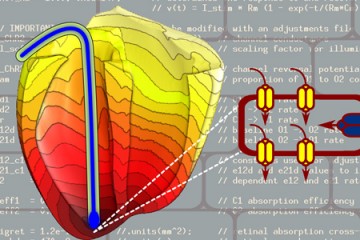Two Johns Hopkins University faculty members have been chosen to receive prestigious grants from the National Institutes of Health allocated for biomedical research projects that face significant challenges but could lead to major health care payoffs. Natalia A. Trayanova, a professor of biomedical engineering, and Hans Tomas Bjornsson, a professor of genetics and pediatrics, are among 78 recipients nationwide of grants awarded by NIH's High Risk-High Reward Program.

Image caption: Natalia Trayanova and Hans Tomas Bjornsson
Trayanova will receive one of 12 NIH Director's Pioneer Awards, given annually to individual researchers who propose innovative projects that have the potential to produce a high impact on a broad area of biomedical or behavioral research. Trayanova's award will provide up to $2.5 million over five years for a patient-specific heart modeling system that will assist in the delivery of personalized diagnoses and treatment.
Bjornsson will receive one of 15 Early Independence Awards, which provide exceptional junior scientists with an opportunity to skip traditional post-doctoral training and move immediately into independent research positions. Bjornsson's award will allocate $1.25 million over five years for research aimed at understanding and developing a treatment for a rare genetic disorder that causes intellectual disability.
"NIH is excited to continue support of visionary investigators, among all career stages, pursuing science with the potential to transform scientific fields and accelerate the translation of scientific research into improved health," NIH Director Francis S. Collins said in announcing this year's award recipients. "This program allows researchers to propose highly creative research projects across a broad range of biomedical research areas that involve inherent risk, but have the potential for high rewards."
The Johns Hopkins recipients expressed gratitude for receiving significant grants that recognize the potential of their research projects.
"This is very exciting news," said Trayanova, who directs Johns Hopkins' Computational Cardiology Lab within the university's Institute for Computational Medicine. "This award will provide a great boost to our efforts to improve the way we diagnose and treat life-threatening heart rhythm and pumping problems."
She will use the funding to help develop and implement a "virtual electrophysiology laboratory," which can simulate the electrical and mechanical functions of a patient's heart. The simulator will use data from the patient's MRI scans to "personalize" each heart model. Trayanova envisions these simulators being used in clinics, allowing doctors to develop specific diagnoses and treatment plans for patients with heart rhythm or pumping disorders. Physicians could also use the simulator to assess the patient's risk of developing a life-threatening arrhythmia.
Bjornsson, based in the School of Medicine's McKusick-Nathans Institute of Genetic Medicine; is part of a research group studying genetic disorders with epigenetic consequences. These disorders often affect proteins known as histones, which associate with DNA and can affect whether genes are turned on. The group's particular focus is a rare disorder called Kabuki syndrome, which causes intellectual disability, immunological problems, and distinctive facial features. Bjornsson is looking for ways to treat the disease by correcting a problem with chemical groups added to the histone tails.
"I'm very honored to have my group's work supported by one of the High Risk-High Reward grants," Bjornsson said. "These funds will further our study of Kabuki syndrome, which we hope may lead to treatments for other causes of intellectual disability as well."








